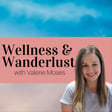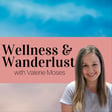
145. Finding Your Bliss Through Movement with Rachel Fleischman
How can dance and movement bring us joy and help us heal?
This week, we’re chatting with Rachel Fleischman, a licensed psychotherapist and social worker, and founder of both Bliss Counseling and Dance Your Bliss. Over the last two decades Rachel has supported thousands of humans to deepen their creativity, live their full expression, and love themselves fiercely.
In our conversation, Rachel shares how movement can help us in our healing journeys, and ways we can spark our creativity in our everyday lives. We also discuss the power of self-compassion and how we can get there, tips for restorative rest, and how we can learn to better understand and appreciate our bodies.
If you enjoy this episode, please feel free to rate and review the podcast on whatever app you’re listening on, and share with a friend!
CONNECT WITH RACHEL
Websites: https://www.blisscounseling.com/ and http://www.dancingyourbliss.com/
Email: dancingyourbliss@gmail.com
CONNECT WITH THE SHOW
Website: WellnessAndWanderlust.net
Instagram: www.instagram.com/wellnessandwanderlustblog
Facebook: www.facebook.com/wellnessandwanderlustblog
Twitter: www.twitter.com/moses_says

